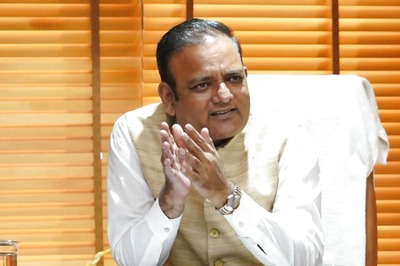
views
Espirito Santo has downgraded Bangalore-based Biocon to "sell" from "neutral" and sharply revised its target price to Rs 186 a share from Rs 350, flagging off several issues, which it says raise accounting and corporate governance questions over at the biotech firm.
The investment bank points out to two issues in particular. The latest being Pfizer scrapping a deal to sell insulin products made by Biocon. Changed priorities at Pfizer (which wants to be active in its own research and business development efforts for diabetes drugs) led to the two companies parting ways, Biocon's CMD Kiran Mazumdar Shaw had said. Several analysts had been quick to point out that scrapping the deal struck only in October 2010 would be a major blow to Biocon.
What Espirito Santo is more concerned is with the manner in which the company aims to use the proceeds received from the deal.
Biocon had received USD 200 million in upfront milestone payment up on signing the deal, of which USD 100 million was deposited in an escrow account. Biocon received a per cent of the milestone payment from the escrow account when the deal was terminated. How much it received, Biocon has not disclosed. Espirito Santo analyst Chirag Talati estimates it to be USD 40 million and the company now has Rs 493 crore on the balance sheet as deferred revenues.
Ideally, this balance of deferred revenues would have been recognised as a one-off payment in the first year. But instead the company has chosen to match it with its R&D costs associated with its insulin programme. So if, for instance, Biocon were to spend USD 25 million on insulin R&D this year, it will "net it off" by recognising an equal amount of deferred revenue from the balance sheet, which Talati says is an issue.
"The removal of R&D from P&L will smooth Biocon's earnings over the coming 3-4 years and to that extent it will also inflate earnings. This is an issue as it could lead to consistent over-valuation should investors, particularly, less informed retail investors, choose to value the company on a P/E basis," he says.
Biocon in turn insists it has done nothing wrong and that its accounting treatments are in line with accepted accounting policies.
"The amounts so received as "one off earnings" cannot be taken to revenues since the company has obligations under the insulin R&D programme. It is incorrect to interpret that the company will not have any R&D costs in future, since the offset is only for programmes which were a part of the contract with Pfizer and not for others. Biocon will continue to have R&D expenses going forward," a spokesperson told moneycontrol.com in response to specific queries.
But the Pfizer deal is not the only issue that worries Espirito Santo's Talati.
Last year, Biocon sold its 77 per cent stake in Germany's AxiCorp to minority shareholders, citing lack of further synergies. The company had said then that the sale happened at Euro 40 million, 33 per cent higher than its acquisition cost in 2008. However, the analyst feels it was anything but.
Talati estimates Biocon received only Euro 5 million in cash for the divestment and the remaining Euro 35 million was ascribed to buying back intellectual property rights, the initial value of which was just Euro 14 million.
"Thus, while on the face of it, it seems that the company made a profit of Euro 10 million on the transaction, in reality, there was a cash loss of Euro 10 million, and notional loss of Euro 21 million in buying back the IP rights," he points out.
Biocon admits it didn't receive any material amount from divesting the stake.
"Please note that Axicorp transaction had a mix of IP and cash (infusion in Axicorp and buyout from promoters) in 2008. At the time of exit, the IP reverted to Biocon and there was a settlement in cash. Though we cannot reveal the exact details, the impact of the transaction in the P&L was neutral," the spokesperson said.
Biocon shares were down 0.7 per cent at Rs 214.20 on NSE in morning trade on Tuesday. The stock has shed 14 per cent since the Pfizer deal termination was announced on March 13. The wider CNX Pharma index has gained 3 per cent over the same period.




















Comments
0 comment